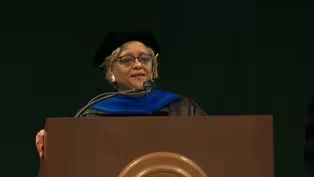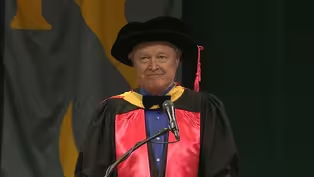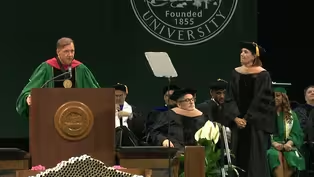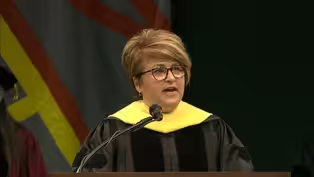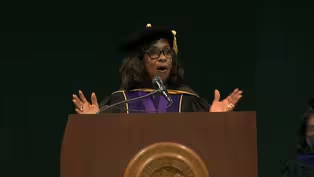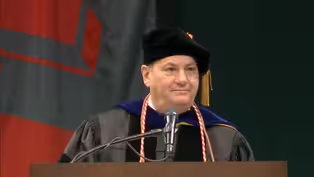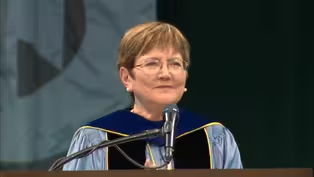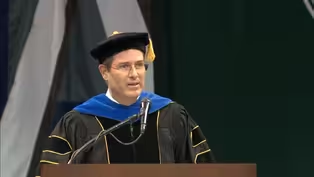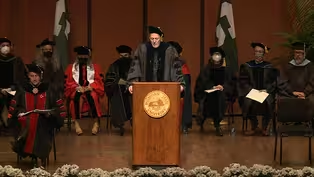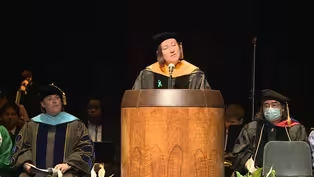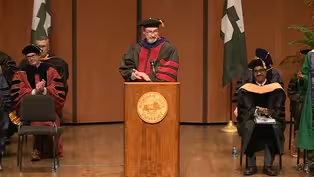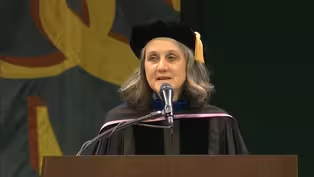MSU Commencements
College of Music | Spring 2022
Season 2022 Episode 11 | 1h 34m 28sVideo has Closed Captions
College of Music | Spring 2022
College of Music - Spring 2022 Commencement Ceremony from Wharton Center on May 7, 2022
Problems playing video? | Closed Captioning Feedback
Problems playing video? | Closed Captioning Feedback
MSU Commencements is a local public television program presented by WKAR
For information on upcoming Michigan State University commencement ceremonies, visit:
commencement.msu.edu
MSU Commencements
College of Music | Spring 2022
Season 2022 Episode 11 | 1h 34m 28sVideo has Closed Captions
College of Music - Spring 2022 Commencement Ceremony from Wharton Center on May 7, 2022
Problems playing video? | Closed Captioning Feedback
How to Watch MSU Commencements
MSU Commencements is available to stream on pbs.org and the free PBS App, available on iPhone, Apple TV, Android TV, Android smartphones, Amazon Fire TV, Amazon Fire Tablet, Roku, Samsung Smart TV, and Vizio.
Providing Support for PBS.org
Learn Moreabout PBS online sponsorshipMore from This Collection
May 5-May 14, 2022
College of Human Medicine | Spring 2022
Video has Closed Captions
College of Human Medicine | Spring 2022 (2h 49m 1s)
College of Natural Science | Spring 2022
Video has Closed Captions
College of Natural Science | Spring 2022 (2h 39m 34s)
Undergraduate Convocation | Spring 2022
Video has Closed Captions
Undergraduate Convocation | Spring 2022 (1h 21m 59s)
College of Agriculture and Natural Resources | Spring 2022
Video has Closed Captions
College of Agriculture and Natural Resources | Spring 2022 (1h 40m 31s)
College of Engineering | Spring 2022
Video has Closed Captions
College of Engineering | Spring 2022 (2h 3m 1s)
College of Education | Spring 2022
Video has Closed Captions
College of Education | Spring 2022 (1h 42m 47s)
College of Arts and Letters | Spring 2022
Video has Closed Captions
College of Arts and Letters | Spring 2022 (1h 20m 30s)
Residential College in the Arts and Humanities | Spring 2022
Video has Closed Captions
Residential College in the Arts and Humanities | Spring 2022 (1h 26m 10s)
Lyman Briggs College | Spring 2022
Video has Closed Captions
Lyman Briggs College | Spring 2022 (1h 25m 22s)
James Madison College | Spring 2022
Video has Closed Captions
James Madison College | Spring 2022 (1h 35m 50s)
College of Social Science | Spring 2022
Video has Closed Captions
College of Social Science | Spring 2022 (2h 48m 10s)
Providing Support for PBS.org
Learn Moreabout PBS online sponsorship("Pomp and Circumstance March no.
1") (audience cheering) (audience applauding) (audience applauding) (audience cheering) (audience applauding) - Good afternoon on this bright sunny day.
Finally, right?
My name is James Forger.
And it is my honor to serve as dean of the Michigan State University College of Music.
And on behalf of our faculty and staff, I welcome you to the College of Music's Spring 2022 Commencement Ceremony.
In, yes.
(audience applauding) In attendance, we have distinguished guests and speakers, family and friends, and of course our graduates.
Let me be the first to congratulate you on your tenacity, your flexibility, your talent, and your significant achievements during these unprecedented times.
What a joy it is to reemerge to a more normal campus, even though we have masks still hanging around, and to be able to celebrate in person with you today.
You made it.
Congratulations!
(audience applauding) (audience cheering) Now, we ask our guests to please rise and join with students and faculty in singing, "America, the Beautiful," led by graduating senior Claire Kaiser, with graduating seniors Shannon Crowley and Michael Eaton.
(steady music) ♪ O beautiful for spacious skies ♪ ♪ For amber waves of grain ♪ ♪ For purple mountain majesties ♪ ♪ Above the fruited plain ♪ ♪ America ♪ ♪ America ♪ ♪ God shed His grace on thee ♪ ♪ And crown thy good with brotherhood ♪ ♪ From sea to shining sea ♪ (audience applauding) (audience cheering) - The occasion of this ceremony finds us assembled in gratitude for a university and community and college community and for faculty and a student body in which we take tremendous pride.
Beyond words of celebration and ceremony, our program today will appropriately include performances from graduating seniors.
This sampling represents only a small part of the talent within this class.
Each of you have developed and expressed your talents individually and collectively, in class and solo performance, and in ensemble.
Through your work, you have accomplished together over the past years, great collaborative work in the best sense of the word.
And we are grateful for the many contributions that you have made.
It's appropriate on this occasion to recognize the people who have made this day possible.
We have in the audience today, those individuals whose constant support and love have sustained you during your time at MSU.
Would the parents, friends, relatives, loved ones of our graduates, please stand so we may thank you.
(audience applauding) (audience cheering) And behind me sit a group of wonderful people who have been dedicated to your success.
They have taught you, mentored you, nurtured you, perhaps they bugged you, moved you along in your growth as composers, music educators, performers, scholars, and future leaders of your professions and communities.
Would the faculty please stand to receive our recognition and deep appreciation.
(audience applauding) (audience cheering) Thank you.
Thanks as well to Professor Rodney Whitaker and the MSU Jazz Orchestra 1, as well as to members of the Class of 2022, who are providing musical selections as part of our celebration today.
And a special note of recognition to Jazz Orchestra 1, who several weeks ago in New York City garnered first place in the Jack Rudin National Collegiate Jazz Championship hosted by Jazz at Lincoln Center.
(audience applauding) (audience cheering) I would also like to thank and acknowledge Andrea Cliver, who will be captioning our ceremony today.
Andrea, thank you very much.
Commencement is a time of joy and it marks an important transition.
This transition can also be bittersweet as students move on leaving friendships, and taking them with them for a lifetime, we hope, and an academic community where you have spent four or more years.
We will miss this graduating class next year.
You have contributed many important dimensions to our musical and academic community.
We thank you.
And we look forward to keeping in touch with you as you move forward and help make the world a better place through the power of music.
At this time, would you please join me in welcoming to the stage graduating seniors, Taylor Thompson and Jake Jaskolski, with professor Ming Wang replacing a third member of the trio who is unfortunately ill and unable to attend today's ceremony.
They will perform Jacques Jules Boufl's "Grand Trio for Clarinets in F major."
(audience applauding) (audience applauding) ("Grand Trio for Clarinets in F major" by Jacques J. Boufl) (audience applauding) (audience applauding) - It is my honor to present the College of Music Distinguished Alumni Award posthumously to a Michigan State University Department of Music graduate, Mr. Edward D. Anderson.
Ed's story begins in Fargo, North Dakota, where he was raised until he attended Concordia College in Moorhead, Minnesota.
There, he earned a bachelor's degree in business, but strangely enough Ed found himself spending most of his time playing trumpet in the band, violin in the orchestra, and singing in the Concordia Choir.
It finally occurred to him that he should become a musician, which he did with great passion.
He began teaching high school in several small North Dakota communities where he met his future wife, an English teacher named Carol.
Following service in the U.S. Navy during World War II, this business degree holder, teacher, veteran, musician moved his young family to Michigan State University, where he earned his master of music degree in 1948.
In the fall of that year, he arrived at Colorado State University and immediately embraced Colorado, the Rocky Mountains, and CSU with great energy and enthusiasm.
In his 34 years as the CSU director of choral activities, his university singers and chamber singers performed extensively at home and on tour.
In addition, Ed was instrumental in the creation of the university fine arts festival and the CSU Madrigal Dinners.
He received CSU's Oliver Pennock Teaching Award for distinguished service.
And the Colorado chapter of the American Choral Directors Association named him a choral music legend.
He was a lifelong church musician.
As director of music at St. Luke's Episcopal Church, he founded their annual Bach Festival.
For Ed, Bach epitomized the true motivation of music in the church; "Soli Deo Gloria," "To God Alone the Glory."
In short, following his studies here at MSU, Ed Anderson went on to become a widely recognized and highly respected music educator and church musician.
During a career that extended over seven decades, he influenced the lives and careers of countless young people through his focus on music education generally, and more specifically spiritual enrichment through sacred music innovation and performance.
Ed passed away in 2014, but his legacy continues through the Edward D. Anderson Choral Scholars Fund, which he established in 2011.
The program's long term objectives include support for the training of a new generation of musicians, and the creation of new and lasting music literature.
Since it's inception, the Anderson Choral Scholars Fund has provided stipends to over 200 high school and college musicians to support their participation in university and church choirs and other musical organizations.
Four of those students have been graduate students in choral conducting here at Michigan State University.
The fund has been responsible for the creation of 15 new choral works; most recently "Standing at the Beam" written by Andrea Clearfield with poetry by Anthony Silvestri, which enjoyed its premiere here on campus on April 2nd, performed by the university chorale and MSU Chamber musicians.
To accept this honor here with us today is Ed's son, our commencement speaker, Dr. Donald Anderson.
It is my distinct pleasure along with Dean Forger to present the MSU College of Music Distinguished Alumni Award to Edward D. Anderson.
(audience applauding) - It's my pleasure to introduce Dr. Donald C. Anderson.
Dr. Anderson is a highly accomplished physician, scientist, and corporate leader whose passion for music and dedication to our college has benefited our community in numerous ways.
To give you a sense of the value he brings to every task he undertakes, I will share this fact.
In 2006, MSU asked Don to launch a modern intellectual property and technology transfer office.
And within that capacity, he launched the university's first effort to accelerate commercial development of our most promising technologies.
It was initially a six-month appointment beginning in 2006.
And each year since it has been renewed.
Currently his MSU appointments include consulting the vice president for research and innovation; directing the program for targeted support grants, for intellectual property, and technology development; and serving as an adjunct professor of pediatrics, infectious diseases, and genetics in the MSU College of Human Medicine.
All of this follows an impressive career as a professor of infectious diseases, pediatrics, microbiology, and immunology, primarily at Baylor University, as well as science and research leadership positions in the pharmaceutical industry.
He participates on scientific advisory boards of biotechnology companies in the U.S., Canada, Europe, Japan, and Australia; drug safety monitoring boards for the FDA; and works as an NIH grant reviewer and scientific journal reviewer.
Before turning the podium over to him, however, I must express our gratitude to Dr. Anderson for his generous support of choral commissions, and for a recent entrepreneurial development fund he established through the College of Music Running Start Program under the direction of Christine Beamer.
I also note that all of the students, faculty, and staff here today who navigated the pandemic with safety while using our music facilities owe thanks in part to Dr. Anderson.
As a physician, a scientist, and as a singer, he provided significant and regular guidance to our College of Music by working with our associate deans regarding safety protocols.
His knowledge of infectious diseases and aerosols was critical in our efforts to determine masking, distancing, and other protocols for our facilities, with specialized advice for classes, rehearsals, practicing, and lessons.
So please give a warm welcome and a resounding thanks to Dr. Donald Anderson.
(audience applauding) - So thank you, Dr. Forger.
Thank you for that wonderful test.
The first half of the talk has already been given, so I guess I'll shorten it for y'all.
As a non-celebrity, non-musician really from Texas, you wouldn't know me, but now you know how my family's been connected to the college for three generations.
And it is remarkable that on this day, May 7th, 1948, Edward D. Anderson was sitting there where you are to get his master's music degree.
So what I was going to do was sketch his career, which has already been very well sketched, to illustrate what you get from a degree certificate in his generation in contrast to somewhat different values that might be expected from more contemporary music education in the current era of innovation.
The theme of this little talk is about innovation.
So you heard about how he went to Fort Collins, Colorado, and he established this following not only in the universities, but outside.
And it permeated through the Midwest, not only in the university, the church colleges, but workshops with children's choirs, the International Peace Garden Camp and tours to Europe, and the Choral Legend Award, which sort of punctuated his career at the age of 90.
Most importantly, though, I think the comment that David meant that his career favorably influenced the personal lives, careers of countless students.
And this was through a focus on traditional music education.
So in a nutshell, he leveraged his master's certificate, his degree to bring music of high quality into the mainstream of Northern Colorado culture.
And I believe his impact can be best measured in human values.
Now, as you sit there today, you envision possibly some additional perspective, a little different outcome, but I could only hope that the rewards of your degree would be commensurate with his.
To achieve your degree certificates, your class survived some unprecedented challenges.
And of course, foremost was the raging SARS-2 COVID 19 pandemic, which involved very special issues, very special health risks and mitigation procedures for music students.
And I don't think the president of your university knew exactly how much different those were.
And this is largely true because the disease is transmitted by respiratory viral aerosols.
And thus, unfortunately, singing is inherently a high risk behavior.
As an ID physician, I was drawn into your college faculty to talk about unconventional procedures for safe teaching.
And I think it's fair to say there were real concerns about the feasibility of teaching music at all in the COVID environment.
And I think we realized there was a level of fragility about the choral and instrumental arts with students, teachers, directors, composers, and publishers, all in lockdown.
So you navigated safely through remote teaching, all the rules, the distancing, the masking, and so on.
But I'll never forget the videos of the graduate chorale rehearsing in outdoor covered parking garages, spaced 12 feet apart, wearing masks with these long nose extensions, goggles, coats, and hats.
And Dr. Rayl gave a very expert description of aerosol science, but I spotted some poor soprano behind him who was shivering.
Actually that seemed to enhance her natural vibrato, which was very impressive.
(audience laughing) Fortunately, life-saving vaccines arrived in late 2020.
It was not by accident, it was because of decades of scientific innovations which preceded them, investments in the bio-pharmaceutical industry of which I'm very proud.
Early research was aimed at developing a vaccine for SARS-1, actually a coronavirus identified in China in 2002, some 20 years ago.
SARS-1 did not become pandemic fortunately, but the research continued and there was this expectation that vaccines would eventually be needed for a SARS-like pandemic, which happened and which you lived through.
By the fall semester of 2020, scientists were able to prove concept that a small nucleotide construct, so-called messenger RNA, could be engineered to penetrate cells, direct production of specific proteins capable of stimulating protective immune responses in humans; a scientific feat unprecedented in the history of science.
Clinical trials of mRNA vaccines for COVID demonstrated high levels of protection thereafter.
And successful immunization campaigns in the spring semester of the next year enabled operations of the college to open up and your return to campus.
Today, we're actually able to assemble in a much safer environment, although I still see masks and I think that's good.
There's no question, though, that the operational disruptions, the College of Music and essentially the entire music industry were bailed out by scientific innovation at its very best.
Unfortunately, despite the availability of free protective vaccines, their level of acceptance in the United States was highly variable, and I'm afraid adversely influenced by complex social public health and political issues.
Somehow we lost one million American souls as of last Monday.
Nonetheless, I believe advances in vaccine technologies and refinements in clinical medicine have positioned us to more effectively respond to future pandemics.
So as a takeaway message to you today, I'm confident that the choral and instrumental arts will endure and thrive, and that your aspirations for rewarding careers will be realized.
You all have youth, health, and a first-rate academic degree on your side.
But understand, when you leave, it will be your responsibility to creatively adapt to future challenges facing the music profession, even a SARS-3 pandemic, if it happens.
I'd like to focus on this last part on the concept of innovation and entrepreneurship in contemporary music education, which fundamentally is not all that different from science and medicine.
It's been an interest in the Office of Research and Innovation where I landed in 2006 to help Dr. Ian Gray establish the MSU Innovation Center.
We're all well aware that there's an amazing innovation buzz throughout the College of Music, possibly more so than any college on campus.
Innovation surrounds all of you in the new Billman Music Pavilion, where every square foot of the walls, ceilings, double floors, and so on, have been creatively designed to optimize and really customize sound quality for any instrument, voice, or group of any size, and at the same time, for example, protect against hearing loss.
Very innovative.
Your website, which is fun to just spend hours scanning, illustrates many innovative musical styles, genres, organizations, ensembles, brands, and instruments, and on and on with clear entrepreneurial potential and career implications for students involved.
This past year, 122 music students were enrolled in the university entrepreneurship courses, including several graduate students who completed the Career Development Certificate.
The college employs two full-time entrepreneurial faculty, unique among major universities, including big 10 schools.
And as you heard, they've launched the popular Running Start competition, which you probably all know more about than I do, which allows students to create their own business entities and exploit cash awards for business development supports.
And this year's grand prize winners, who must be in the audience, started a venture called Mobile Music Making, which brings early childhood music programs to the Refugee Development Center of Lansing.
The initial objective is more about social good through music rather than dollar profits.
But, importantly, it links the MSU Community Music School to this development center, and it should be sustained.
Many other innovative student projects throughout the college are providing daily business development skills in preparation for real world entrepreneurial careers in the field of music.
Finally, the future of the college may potentially witness the creation of its own intellectual property base as a derivative of its many innovations.
I see such a long-term transition as an added dimension of self-sustained long-term stability and growth of the college.
This cultural evolution of sorts need not compromise the traditional artistic rights of faculty and students, nor distract from the academic mission of music education, which Edward Anderson so greatly valued, and of course we all value.
So in closing, thank you.
Thank you, Dean Forger.
Thank you, David.
Thank all of you.
Thank MSU.
Good luck.
Best wishes.
Go green, go white.
Go innovate and change the world.
(audience applauding) - Thank you, Dr. Anderson, for those remarks and for all you have done to help us along the way.
Now, please welcome the MSU Jazz Orchestra 1 conducted by university distinguished professor Rodney Whitaker, featuring graduating jazz studies majors, Dante Billeci, Rachel Coleman, Elise Berner, Thomas Crandell, Jack Trathen, Erik Law, Koji Cassetta, and Luke Sittard as they perform the Joe Henderson composition "Isotope."
(audience applauding) (audience cheering) ("Isotope" by Joe Henderson) (audience applauding) (audience applauding) (audience applauding) (audience applauding) (audience applauding) (audience applauding) (audience applauding) (audience applauding) (audience applauding) (audience applauding) (audience cheering) - Good afternoon, everyone.
It is my honor today to introduce our student speaker from the 2022 College of Music graduating class, Christine So.
(audience cheering) (audience applauding) Christine, or Steen as she's known to her colleagues and friends, arrived here at MSU in the same semester I joined the College of Music faculty, fall of 2018.
As an oboist in concert band, and later in symphony band, Christine quickly demonstrated that she's not only a great musician, but also a great thinker and leader.
Knowing Steen, as we know and love her, for the entirety of her time here at MSU has not only provided me the opportunity to get to know her as a young musician, but to also witness her growth as a musician and as a young adult who has become increasingly involved with her community in ways that have brought both change and innovation.
As a leader, Christine has been involved not only in activities within our college, but also across our campus: from the Zeta Epsilon Chapter of Kappa Kappa Psi National Band Fraternity, to work within the big 10 network of universities as their director of diversity, equity, and inclusion, to membership in the 2021 MSU homecoming court, to serving as chief diversity equity and inclusion officer in the associated students of Michigan State University.
Christine has worked with her peers to make a difference for students throughout the MSU campus community.
This fall, Christine will be attending Tufts University in Boston, Massachusetts to begin studies towards the MA in diversity and inclusion leadership, with her ultimate goal of making the fine arts more accessible for all.
I think that all of us here who know Christine know that she will do exactly that, and that this Spartan will continue to make a difference in every community of which she's a part.
Can everybody join me now in welcoming to the podium, your Class of 2022 speaker, Christine So.
(audience applauding) (audience cheering) - Thank you.
- Congratulations.
- (giggles) Sorry, I'm so giggly.
It was such a nice introduction, Dr. Golden; thank you.
Good afternoon to the College of Music Class of 2022, fellow peers, friends, family, faculty, and staff.
My name is Christine So, and it is such a pleasure and honor to be speaking to y'all today.
Before I start, I would like to start with the university land acknowledgement.
We collectively acknowledge that Michigan State University occupies the ancestral, traditional, and contemporary lands of the Anishinaabeg, Three Fires Confederacy of Ojibwe, Odawa and Potawatomi peoples.
The university resides on land ceded in the 1819 Treaty of Saginaw.
We recognize, support, and advocate for the sovereignty of Michigan's 12 federally recognized Indian Nations, and historic Indigenous communities in Michigan, for Indigenous individuals and communities who live here now, and those who were forcibly removed from their homelands.
Thank you.
As we are all together in this shared space, I hope you can spare me some of your attention as I help journey through what our resilient class of graduates have endured to be here with loved ones.
To earn to be in this space has not been easy.
The stress of cramming in that music theory midterm you forgot about, maybe playing too hard and not working hard enough, or taking a nap that went a little too long.
The hours we have spent sitting near a piano, trying to figure out what the next pitch is for that ear training assignment, we've all been there.
That 8:00 AM freshman theory class, (chuckles) I know we all wanted to hit that snooze button, but we still made it, and here we are.
I don't know about you all, but becoming a music major sounded absurd to my family and friends at times.
So I hope today you are proud to be graduating with a music degree as we are some of the most ambitious people.
So pat yourself on the back as those hours of practice made it worth it.
Living in West Circle my freshman year, I could hear the screams of people saying, "It's game day," as well as the sound of the Spartan Marching Band in front of Landon Hall.
I remember that first game day here at Michigan State, walking around in my first ever owned Michigan State University T-shirt.
Whether you're the first family to be a Spartan, or the second or the fifth, we all have the mutual understanding of wearing our gear.
The sea of green and white, Spartans everywhere, the infamous striped overalls, the countless corn holes, the smell of barbecue; even if you weren't going to the game, I know the majority of you can relate to those game day tailgates and festivities.
I remember walking into the Union and smelling late night, my freshman year, after a long day of classes, most of you know that late night pizza and cheese bread did hit different.
(audience chuckles) But also let's not forget the mac and cheese though.
I have to mention the smell of Dairy Store ice cream that just smells so sweet.
And don't even try to act like you never attempted waiting in that line at Wells Hall Starbucks.
I remember how intimidating it was to step in my first bus ride, not exactly confident when to pull that yellow line.
I bring all these fond and familiar memories here today because not only are they my own, but they're most of yours here as well.
As our time comes to a close, I hope you can reminisce on the good and bad memories and what they have taught you.
The lessons we learn here are some of the ones we each continue to carry as our chapter at Michigan State closes.
Each of us have created our mark as Spartans and found our way to this very moment.
College is a time to find yourself and learn who you're meant to be as each of us have a destiny to fulfill, even if you aren't sure yet.
But I want to reassure you that you are exactly where you are supposed to be.
As music students, however, our experience has been a little bit more unique.
As a music student, we have vastly different experiences as a Spartan.
For us, homework requires a textbook and a laptop here and there.
But for most of us, it's sitting in the practice room, running through those two to three measures over and over again because it just needs to be just right.
I know each and every one of us, including myself, know the frustration yet rewarding satisfaction that comes with being an aspiring musician.
Our class is the one who endured a global pandemic in the middle of our college careers, shifted to an online format where all of a sudden music making with our fellow peers and friends were taken away from us.
We had to define what it truly meant to be a Michigan State student, but also a musician.
For many of us, music making with others, playing or singing in large ensembles is so important, and a big reason why you probably wanted to pursue music.
For many of us, it felt like the music was being composed with our story.
But all of a sudden the manuscript paper got pulled away from us as if we came across a fermata that never ended.
However, that fermata has passed.
We have slowly been building up to the climax of where we have left off.
And I'm so grateful to be here, as we come to a close in our musical journeys here at MSU.
If no one has said it to you, or said it to you tons of times, I would like to say I'm proud of the backbreaking work you have done as a musician.
You are a Spartan, and we always manage to forge our journey.
For myself, I'm the first Spartan in my family, loud and proud.
But what does it mean to be a Spartan?
We always call ourselves Spartans, but many of us don't take time to fully encapsulate what this word actually means.
Despite Spartan's deriving from the historical city Sparta in ancient Greece, Google told me, thank you, Google, the definition of a Spartan is quote, "A person of great courage and self discipline."
Each of us here in this graduating Class of 2022, took a leap of courage to come to this university.
Each of us had the discipline to endure the differing struggles of a global pandemic and define what it meant to be a music student during this time.
Each of us truly embodies what it means to be a Spartan because we are all here today being recognized for what we worked so hard for; and that is to graduate.
(chuckles) Before I close, my dear seniors, I hope you can acknowledge the hardships that you have been able to overcome in a non-traditional college experience.
We never give ourselves, the toughest critics, enough credit.
Today, I'm here to tell you to please take a moment to reflect on how far you've come to this exact moment and be proud of all the adversity you have achieved to be here today.
Like I mentioned earlier in my sentiments today, I hope you'll continue to wear your gear, or if you even decide to think of it a step further, your gear is your helmet; a helmet a Spartan wears.
Continue to wear it proudly as you continue marking your journey wherever it takes you after this moment.
As you wrap up your final measures in this movement we call Michigan State, I want to be able to hear the finale as you crescendo up to your final and amazing note.
Congratulations, Class of 2022, because we've made it.
Go Green!
- [Audience] Go White.
(audience applauding) (audience cheering) - Would you now welcome to the stage graduating seniors, Shannon Crowley, Mackenzie Jacobs, Sean Holland, Cole Harvey, and Michael Eaton, who will perform "Tornami A Dir Che M'Ami" from "Don Pasquale" composed by Gaetano Donizetti.
(audience applauding) ("Tornami A Dir Che M'Ami from 'Don Pasquale'") (singing in a foreign language) (audience applauding) (audience cheering) - We now take the opportunity to present some special awards.
We have the pleasure of awarding the Dortha J. and John D. Withrow Excellence in Teaching Award today.
This endowed award is given annually on the basis of peer review to exceptional members of the MSU College of Music faculty who have rendered distinguished service to the university and the student body through excellence in instructional performance and or scholarly activities.
This year's recipient is professor of percussion, Gwendolyn Dease.
Unfortunately, Professor Dease can't be with us today, but she will receive a plaque and a cash stipend when she returns to campus.
So please join me in congratulating Gwen.
(audience applauding) - This commencement marks a time of transition, not just for our graduates today, but for a highly valued colleague who has been an important and impactful member of the College of Music faculty.
Diego Rivera is associate professor, (audience cheering) Diego Rivera is an associate professor of jazz studies, saxophone and improvisation, and associate director of jazz studies.
After 20 years on our faculty, he will be graduating to a new position and a new set of responsibilities as director of jazz studies at the Butler School of Music at the University of Texas at Austin.
Please join me in celebrating Professor Rivera and thanking him for his many contributions to student success at Michigan State University.
(audience applauding) (audience cheering) - Good afternoon.
At the April Board of Trustees meeting, 180 students from all graduating seniors were recognized with Board of Trustees awards for having the highest cumulative scholarly records by the close of the preceding semester.
I would like to recognize Shannon Crowley, Hailey Diehl-Olger, and Dominic Occhietti who are recipients of the 2022 Board of Trustees Award.
Shannon, Hailey, and Dominic, please stand to be recognized.
(audience applauding) (audience cheering) I would like to ask Professor Diego Rivera to join me at the podium to share the announcement of this next award.
The recipient of the 2022 College of Music Outstanding Senior Award is Dante Billeci.
Dante, would you please join us at the podium.
(audience applauding) (audience cheering) - As Dante's making his way up to the stage, I'd like to say a few words.
Dante's most certainly built an outstanding record of excellence during his time here at Michigan State.
He's excelled in the classroom, he's excelled as a musician, won the respect and admiration of virtually every guest artist that has come to hear him, come to know him.
Also, his classmates hold him in high regard.
In addition, he helped author a scholarly research paper as an undergrad.
He served as an RA.
He served as a mentor to a number of students, both formally and informally.
And just a number of things.
But I think what is most outstanding about Dante is that although he's built a record of distinction, he truly values learning.
He truly values experiences.
And I think, although I could stand up here and brag about having Dante as a student, I think what he's taught me is what's more important is to value my experience with Dante.
So congratulations.
(audience applauding) (audience cheering) - Students who participate in and fulfill the requirements of the Honors College by completing enriched programs of study are identified as graduating with Honors College Distinction.
These graduates wear a white college stole with the HC designation.
Would those students who are graduating as members of the Honors College, please stand and be recognized.
(audience applauding) (audience cheering) - Students who attain a grade point average of 3.95 and higher are awarded university high honor.
University honor is awarded to students who have earned grade point averages of 3.82 to 3.94.
The gold cord added to the academic robes designates these honors.
Would all students who are graduating with high honor and with honor, please stand and accept our congratulations.
(audience applauding) (audience cheering) In recognition of Michigan State University's ongoing commitment to education abroad, I ask all graduates who participated in an education abroad program while at MSU, to please stand and be recognized.
(audience applauding) (audience cheering) Many College of Music students give their time and talents to important outreach and engagement activities.
These have included participation in the college's greater Lansing Community Concert Series, musical memories and educational engagement residency programs, and early childhood classes at the Community Music School, among many other programs.
Would those graduating students who have participated in community outreach activities, please stand and be recognized.
(audience applauding) (audience cheering) In November, 2015, the College of Music formed two diversity and inclusion working groups: one comprised of faculty, the other exclusively of students.
Since then, these two groups have met collectively and independently to formulate strategies for strengthening diversity, equity, and inclusion, both within the college and across campus.
Members of the faculty and staff working group were selected to represent all disciplines and areas of study within the College of Music.
Would those individuals serving on the faculty and staff group, please stand and be recognized.
(audience applauding) Members of the student group were selected based on recommendations from faculty and staff, and represent both the graduate and undergraduate levels from the various disciplines and areas of study within the College of Music.
Would those students serving on the student group, please stand and be recognized.
(audience applauding) I would like to ask Professor Rodney Whitaker to join me at the podium now to share the announcement of these next awards.
(audience applauding) (audience cheering) There he is.
(chuckles) Okay.
Each year representatives on the College of Music Diversity and Inclusion Committee choose three faculty or staff members and three students to receive awards.
Richard Fracker worked alongside his colleagues continuing to recruit a diverse pool of talented students.
For the past 13 years, Richard was instrumental in the MSU-China Collaboration, which was one of the first programs of its kind in the United States.
He has helped to create initiatives which promote diversity, equity, inclusion, and belonging.
Also, he was instrumental in the development of the Diversity Committee and contributed significantly to its work.
He will receive a plaque and cash stipend.
Richard, would you please come to the podium and receive your plaque.
(audience applauding) Congratulations.
- [Richard] Thank you.
- As a member of the jazz studies area, Diego Rivera provided significant outreach, recruitment, and performances in the Detroit area with programs such as Jazz in the Studio, Detroit Symphony Civic Jazz, and Youthville.
He was also instrumental in the development of the Diversity Committee and contributed significantly to its work.
He will receive a plaque and cash stipend.
Diego, would you please come forward and receive your plaque.
(audience applauding) (audience cheering) - Congratulations.
- Thank you.
- Dr. Sarah Long has been a leader in fostering an environment of diversity in her teaching.
She has worked extensively to eliminate different perspectives and histories in her teaching, such as the inclusion of North African and Middle Eastern histories in the study of her classes on early music.
In her work on the music of Africa, Dr. Long goes beyond traditional classroom methods by engaging with students through the performance of ewe drumming from Ghana, and the mbira traditions of the Shona culture of Zimbabwe.
Most recently, Dr. Long played a critical role in the creation of the greater opportunities for DEIB within the musicology curriculum.
She will receive a plaque and cash stipend.
Sarah, would you please come forward to receive your plaque.
(audience applauding) (audience cheering) I would also like to present excellence and diversity awards to three students.
PhD candidate, Rebecca DeWan's scholarship demonstrates her commitment to both teachers and to equity.
Over the last year, she has developed and refined her knowledge of anti-racism and trauma-informed pedagogy, and has extensive knowledge of the literature in these areas.
Her doctoral work focuses on facilitating courageous conversations in the choral classroom.
PhD candidate, Erika Knaps' doctoral work focused on creating a collaborative teacher study group that focused specifically on the intersection of disability and race.
Her deep interest in informing music teachers' views on race and disability led to the selection of this topic and further demonstrates her commitment to examine teachers' perceptions of these issues in relation to the students they teach.
And, finally, to undergraduate student Sean Holland, a member of the Color Me Music and a member of his executive board.
He met throughout the semester with Dean Forger, Associate Dean Rayl, director of diversity, Professor Whitaker, his colleagues from Color Me Music, music education, composition, and music history consulting on curricular matters in the College of Music.
Sean, would you please come forward to receive your plaque.
(audience applauding) (audience cheering) - [Sean] Thank you, prof. - I'm proud of you.
- Thank you.
- Congratulations.
- Thank you.
- Thanks, Rod.
Would you please welcome to the stage Clap 7, with graduating senior Jacob Feldman, with Charlotte Jansky, Aaron Plegue, and Natalia Warthen, performing "Introduction and Variations on a Popular Round" composed by Gabriel Pierne.
(audience applauding) (audience applauding) ("Introduction et Variations sur une Ronde Populaire") (audience applauding) (audience cheering) - At this time, we shall begin the conferral of the baccalaureate degree upon candidates from the major disciplines of the College of Music.
I will now ask the area chairpersons and distinguished colleagues to come forward and read the names of the graduates.
I'm pleased to introduce Dr. Kevin Bartig, Chair of Musicology and Ethnomusicology.
- Will the candidates for the bachelor of arts degree in music, please come forward.
(audience laughing) Christine So.
(audience applauding) (audience cheering) Lucas Crawford.
(audience applauding) (audience cheering) I'm pleased to introduce my colleague, David Biedenbender, Associate Professor of Composition.
- Will the candidates for the bachelor of music degree in composition, please come forward.
(audience applauding) (audience cheering) Lucas Michael Hardy.
(audience applauding) (audience cheering) Gabe Schroeder.
(audience applauding) (audience cheering) Kiara Hope Glekler.
(audience applauding) (audience cheering) Michael Eaton.
(audience applauding) (audience cheering) I'm pleased to introduce my colleague, Rodney Whitaker, Director of Jazz Studies.
- Sofia Rabiela, my favorite student.
(audience applauding) (audience cheering) Elise Berner, my favorite student.
(audience applauding) (audience cheering) Eric Joseph Law, my favorite student.
(audience applauding) (audience cheering) Jack Trathen, my favorite student.
(audience applauding) (audience cheering) Rachel Coleman, my favorite student.
(audience applauding) (audience cheering) Dante Billeci, certainly my favorite student.
(audience applauding) Luke Sittard, my favorite guitar student.
(audience applauding) (audience cheering) If you can join me and welcome my colleague from music education.
Who is it?
Oh, sorry.
Ryan Shaw.
(audience applauding) - Will the candidates for the bachelor of music degree in music education, please come forward.
Jacob Feldman.
(audience applauding) Claire Elizabeth Kaiser.
(audience applauding) (audience cheering) Louise?
- Huh-uh.
- [Ryan] Maria Louise Schoon.
(audience applauding) (audience cheering) Sean Holland II.
(audience applauding) (audience cheering) Kaitlin Wilde Gaynor.
(audience applauding) (audience cheering) Hailey Diehl-Olger.
(audience applauding) (audience cheering) Jackson Hall.
(audience applauding) (audience cheering) Meagan Ann Wozny.
(audience applauding) (audience cheering) Marisa Balamucki.
(audience applauding) (audience cheering) Rowbal?
Annabelle Katherine Rowbal.
(audience applauding) (audience cheering) Meghan Rebeckah Woell.
(audience applauding) (audience cheering) Hailey Cunningham.
(audience applauding) (audience cheering) Sean Ryan.
(audience applauding) Jacob Daniel Valentino.
(audience applauding) (audience cheering) Margaret Riley Camp.
(audience applauding) (audience cheering) I'm now pleased to introduce my colleague, Ava Ordman, Chair of the brass area.
- It is my pleasure and honor to welcome the candidates for the bachelors of music and performance to the stage.
Jake Weichert.
(audience applauding) (audience cheering) Noah Ende.
(audience applauding) (audience cheering) Dominic Aurelio Occhietti.
(audience applauding) (audience cheering) Joel Kayser.
(audience applauding) (audience cheering) Kyle Allen Sodman.
(audience applauding) (audience cheering) Jacob Jaskolski.
(audience applauding) (audience cheering) Taylor Thompson.
(audience applauding) (audience cheering) Thomas Pererato.
(audience applauding) (audience cheering) Oh.
(chuckles) Shannon Crowley.
- Teixeira.
- Teixeira.
(audience applauding) (audience cheering) Mackenzie Jacobs.
(audience applauding) (audience cheering) And Cole Harvey.
(audience applauding) (audience cheering) - As we will now confer degrees, I ask the degree candidates to please stand.
On behalf of President Samuel L. Stanley Jr., who has delegated to me the authority of the State of Michigan vested in the Board of Trustees, I confer upon all of you the degrees for which you have been recommended with all the rights and distinctions to which they entitle you.
I now ask each of you to move your tassel from the right side of your cap to the left side, signifying your admission to the community of scholars and the fact that you are indeed graduates of Michigan State University.
Congratulations.
(audience applauding) (audience cheering) Thank you, MSU alumni.
I now invite all to rise and sing both verses of the "Alma Mater" led by graduating senior Maria Schoon and graduating seniors, Sean Holland and Michael Eaton.
Lyrics can be found in your program insert.
Following the "Alma Mater," we ask that the audience be seated until the platform party, the faculty, and the graduates have recessed.
(audience cheering) (audience applauding) (gentle music) ♪ MSU, we love thy shadows ♪ ♪ When twilight silence falls ♪ ♪ Flushing deep and softly paling ♪ ♪ O'er ivy-covered halls ♪ ♪ Beneath the pines we'll gather ♪ ♪ To give our faith so true ♪ ♪ Sing our love for Alma Mater ♪ ♪ And thy praises, MSU ♪ ♪ When from these scenes we wander ♪ ♪ And twilight shadows fade ♪ ♪ Our memory still will linger ♪ ♪ Where light and shadows played ♪ ♪ In the evening oft we'll gather ♪ ♪ And pledge our faith anew ♪ ♪ Sing our love for Alma Mater ♪ ♪ And thy praises, MSU ♪ (audience applauding) (audience cheering) ("MSU Fight Song") (audience clapping rhythmically) ♪ Go right through for MSU ♪ ♪ Watch the points keep growing ♪ ♪ Spartan teams are bound to win ♪ ♪ They're fighting with a vim ♪ ♪ Rah, rah, rah ♪ ♪ See their team is weakening ♪ ♪ We're going to win this game ♪ ♪ Fight, fight ♪ ♪ Rah, team fight ♪ ♪ Victory for MSU ♪ (audience clapping rhythmically) (audience cheering) (audience applauding) (audience cheering) (audience speaking indistinctly)

- News and Public Affairs

Top journalists deliver compelling original analysis of the hour's headlines.

- News and Public Affairs

FRONTLINE is investigative journalism that questions, explains and changes our world.












Support for PBS provided by:
MSU Commencements is a local public television program presented by WKAR
For information on upcoming Michigan State University commencement ceremonies, visit:
commencement.msu.edu
